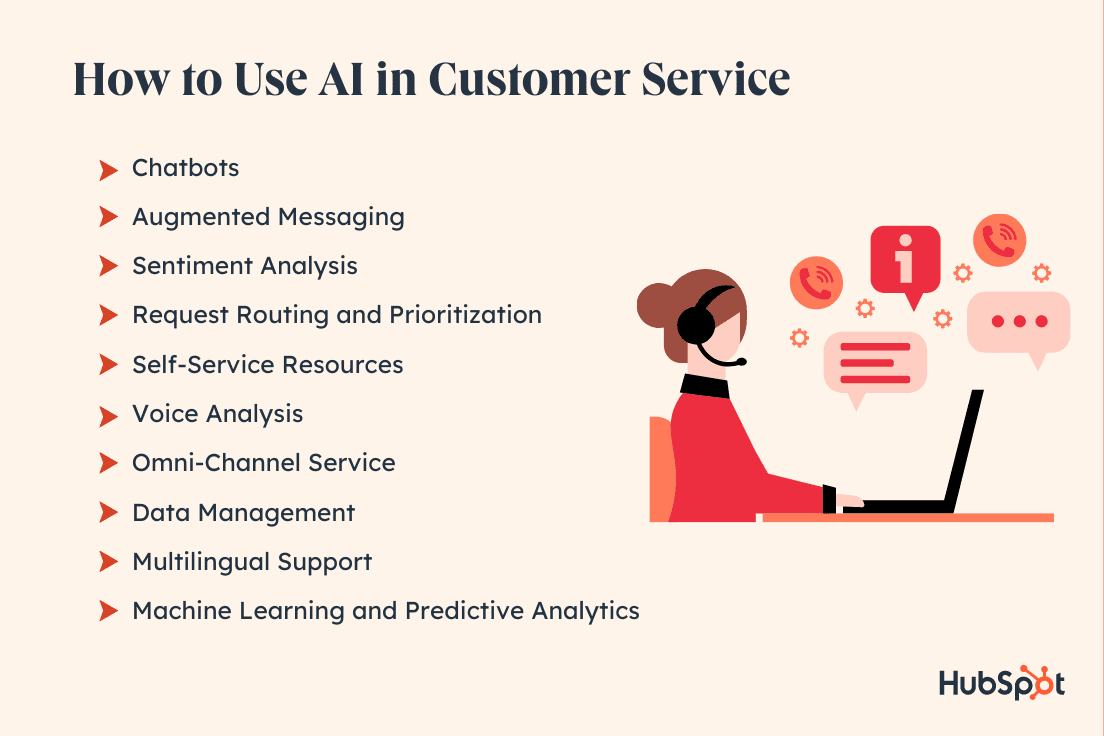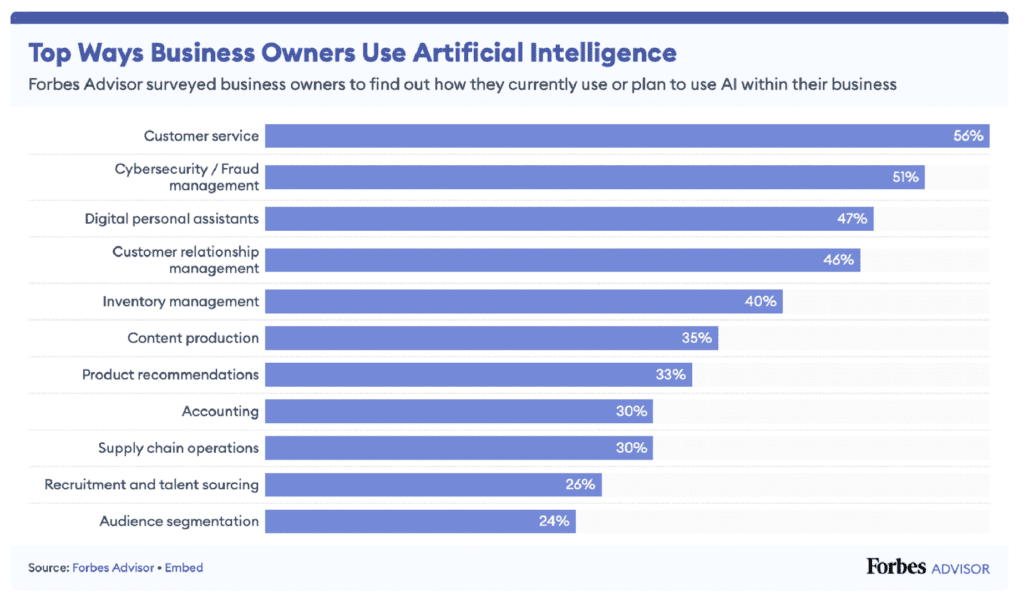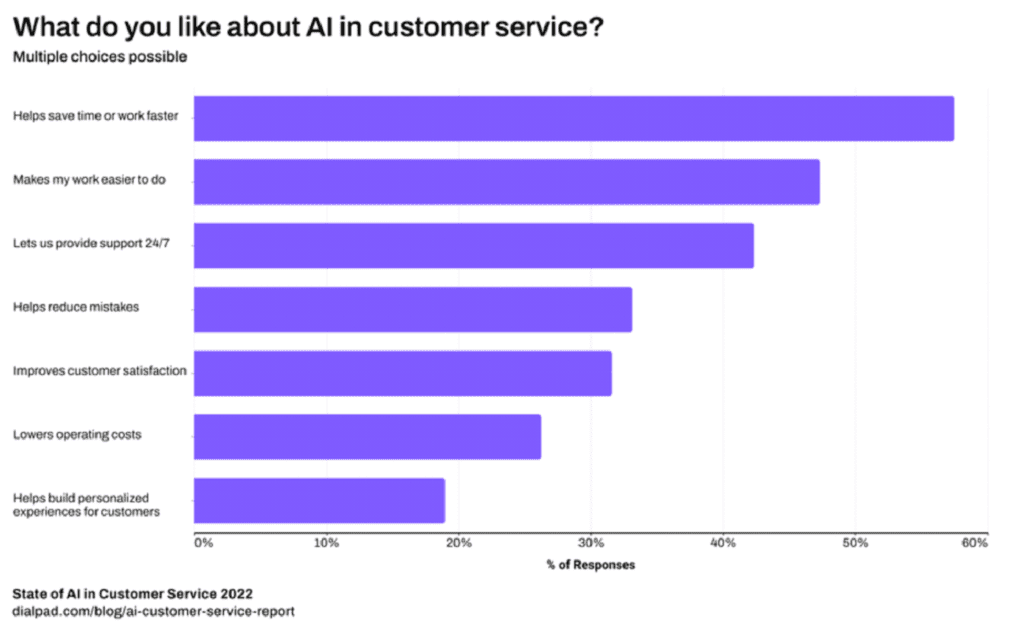Introduction
Artificial Intelligence (AI) is surely revolutionizing numerous industries. The AI market is projected to grow from $150 billion in 2023 to $1,345 billion in 2030, at a whopping 36.8% Compound Annual Growth Rate (CAGR).
And at least 35% of companies are already using AI in their business, and an additional 42% are exploring it. However, the exhaustive list of AI business applications is still in the early stages.
Image Source: Forbes Advisor
Generative artificial intelligence (AI) has particularly enjoyed the spotlight lately, also due to the rise of ChatGPT and its peers. After all, ChatGPT had 1 million users within the first 5 days of its release. It is no surprise then that 97% of business owners believe that ChatGPT will ultimately help their business.
And the use cases of generative AI in customer service are already advanced. Chatbots and other customer service tools are helping businesses reduce costs while improving the customer experience. Also, generative AI is helping businesses provide customized user experiences or create high-quality content for use across different marketing channels.
However, there are additional, perhaps underutilized yet important use cases for AI in customer service.
Opinion mining in competitor analysis
With the power of Natural Language Processing (NLP), AI can be used to scrape customer opinions across public reviews, social media comments, commissioned user surveys, and other channels containing relevant feedback. In turn, the technology can then generate sentiment analysis or opinion mining, to identify important trends, bottlenecks, and areas of customer delight. These insights can then be leveraged across the organization: from informing the product roadmap to guiding improvements in customer service practices.
In addition to opinion mining for internal purposes, it can also be applied to generate competitive analysis. By analyzing public competitor reviews, the technology can generate important directions for competitive positioning. What are you doing better than the competition? Flag it in your marketing campaign. What do your prospective target customers need the most? Prioritize that product or service feature. What is the biggest bottleneck in your industry? Find innovative mitigants to solve it.
Inventory management
Effective inventory management is critical for business success, particularly in the e-commerce space. It can help you improve your sales forecasts, reduce storage costs, and handle fulfillment with accuracy, ease, speed, and an optimized cost structure. Plus, keeping items reliably in stock, reduces (or even eliminates) stock-related inquiries for the customer service team.
And Machine Learning (ML) can help sellers maintain the optimal inventory balance. Based on the combination of historical sales, current product inventory, and relevant logistics, the technology can generate dynamic forecasting to real-time optimize the fine line between immediate product fulfillment and excess stock.
Agent training
AI has emerged as an effective training tool by constructing simulations of various situations an employee might face. In the customer service space, AI can take the role of the customer and present new agents a multitude of prospective scenarios thereby arming them with a breadth of powerful response techniques.
Data Enrichment & Customization
Customer expectations are at an all-time high, and they include personalization. For instance, 72% of customers expect agents to already know who they are, and what they’ve purchased, as well as have insight into their previous engagements with the brand.
And if coupled with your CRM or another internal data depository tool, AI can generate helpful and customized data points for your customer interactions. For example, based on order history, the technology can provide recommendations for product add-ons or complementary purchases. Or, if a customer had previously dialed in for the same issue, the historical data will quickly draw up the full context, thereby eliminating the need for the customer to repeat the same information.
Agent profiling
While agent routing and customer profiling already are popular best practices, agent profiling can also be a powerful tool. Different agents have different skill sets, communication styles, and customer interaction preferences. While some particularly enjoy up- or cross-selling, others deal better with angry callers. And AI can help match customers to the optimal agent depending on the type of inquiry, customer history, customer profile, sentiment, and other important factors. While directly impacting the customer experience, companies utilizing this practice will also improve employee satisfaction and, ultimately, drive productivity and retention.
Content optimization
First-call resolution through self-service options is typically the preferred way for both customer and agent or organization. But to remain relevant, these self-service options need to be updated based on real customer inquiries and a continuous basis. Here, AI can help quickly identify gaps and recommend solutions for how to close them. For example, the technology can pinpoint gaps in the knowledge base based on trending topics across customer inquiries, survey responses, or feedback forms.
Closing Thoughts
The state of customer service can make or break a business. 96% of customers say that customer service plays a vital role in their choice of and loyalty to a brand. Ultimately, customer service organizations have the power to drive positive brand sentiment in several ways. At least 56% of customers would stop doing business with a brand due to a poor customer service experience.
And as AI has taken the world by storm and is revolutionizing different industries, the customer service space hasn’t been left unscathed either.
Most customer service professionals are bullish about the future: 78% of them feel optimistic about AI, while 66% think that AI has had a positive impact on business performance.
Image Source: Dialpad
But while companies are primarily using AI in customer service for call routing, the processing of customer inquiries, or the popularized use case within generative AI, there are many additional pockets of opportunities to leverage the power of AI to improve the customer experience.
Having a first-mover advantage on some of those underutilized AI use cases might just be what helps set you apart from your competition and even further delights your customers.






